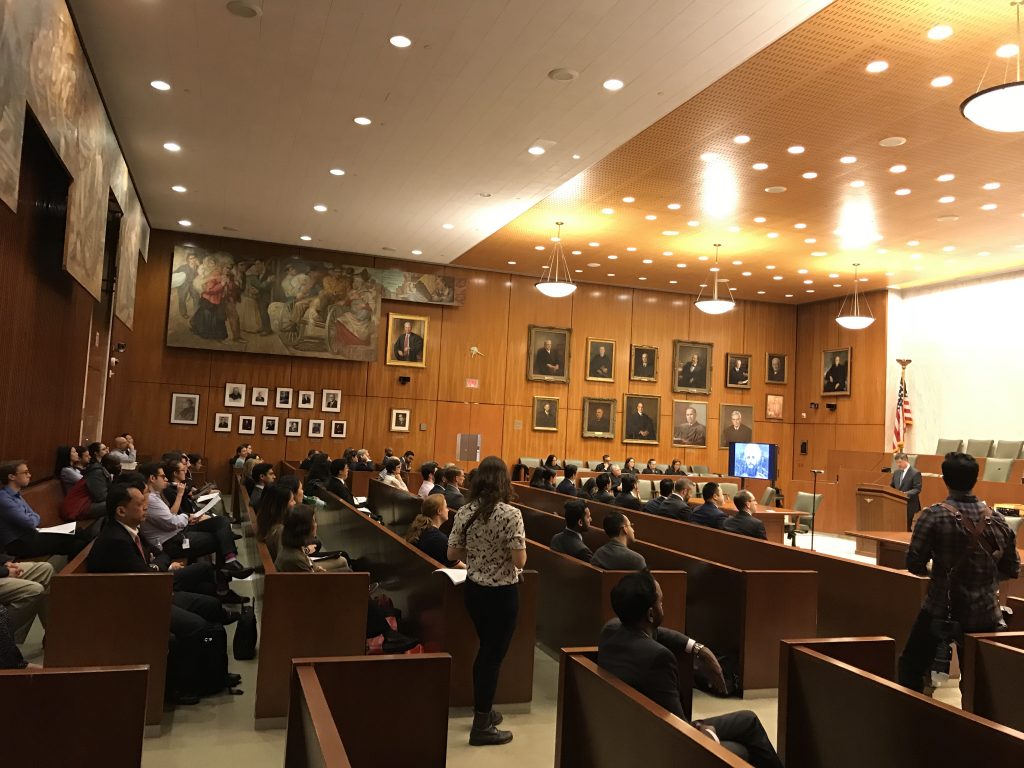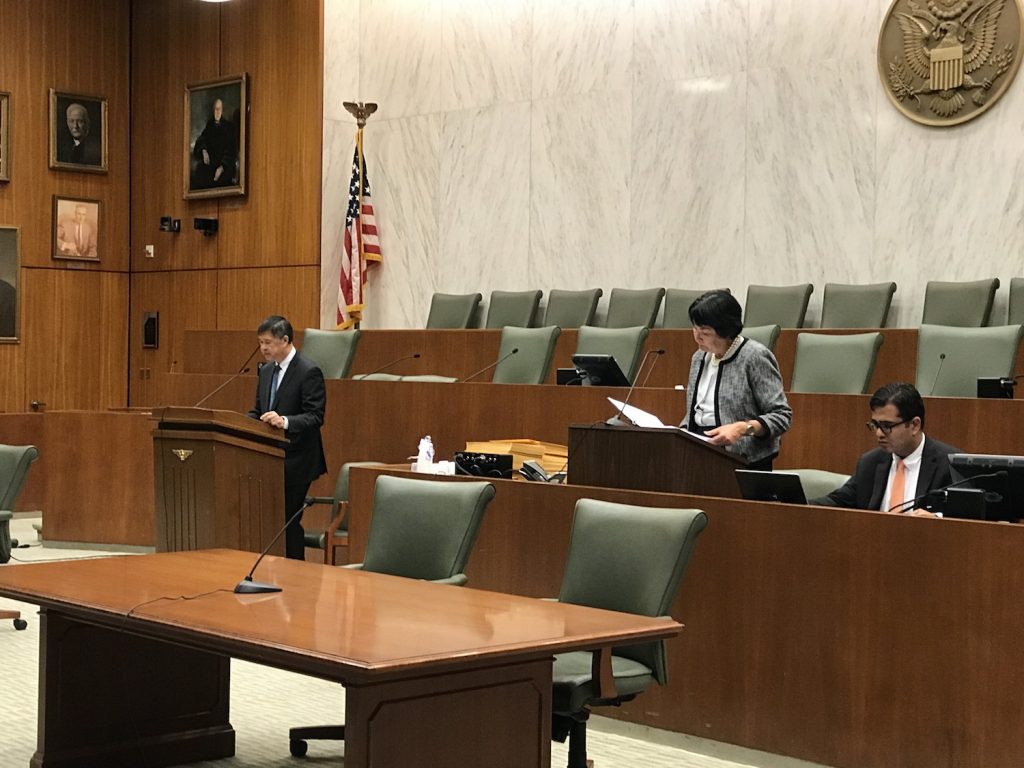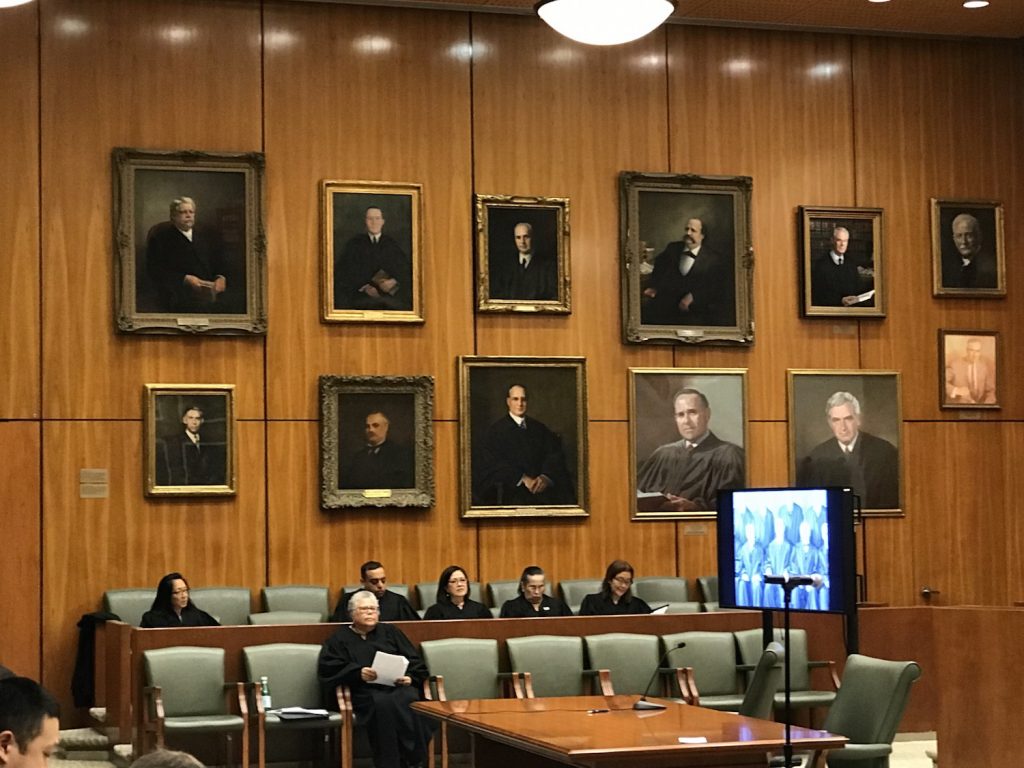Bankruptcy Judgeship Vacancy – The United States Court of Appeals for the Second Circuit invites applications from qualified candidates for a 14-year appointment as United States Bankruptcy Judge for the Eastern District of New York. There are two vacancies in the Eastern District of New York, one in Brooklyn and one in Central Islip. For announcement click here, for application click here. The deadline to submit an application is August 7, 2025.
Summer Internship Opportunity – U.S. Attorney’s Office for the Eastern District of New York
The United States Attorney’s Office for the Eastern District of New York (EDNY)’s ten-week full-time program offers law students summer internships in both the Criminal and Civil Divisions. Student interns are afforded the opportunity to participate in the wide range of work performed by our Assistant United States Attorneys, including stand up participation in court proceedings, and invitations to attend a variety of events over the summer.
Details:
EDNY hires approximately 90 summer interns in both the Brooklyn and Central Islip offices, Criminal and Civil Divisions. All summer internships are ten weeks, full time and unpaid.*
Intern assignments can include:
· Making arguments in court
· Assisting in trial preparation
· Participating in witness interviews or civil depositions
· Legal research and writing
· Observing hearings, arguments and trials in the district court and Second Circuit Court of Appeals
Previous events have included:
· Brown bag luncheons featuring guest speakers on a range of topics
· Guided tours of the NYPD Ballistics Laboratory, Metropolitan Detention Center and law enforcement counterterrorism operations
· After-work social hours
Applications open December 1. More information can be found here.
*Summer interns are eligible to apply for a limited number of summer stipends awarded by the Federal Bar Council and the Eastern District Association.
AABANY’s Litigation and Judiciary Committees Host Luncheon and Courtroom Tour with EDNY Magistrate Judge James Cho
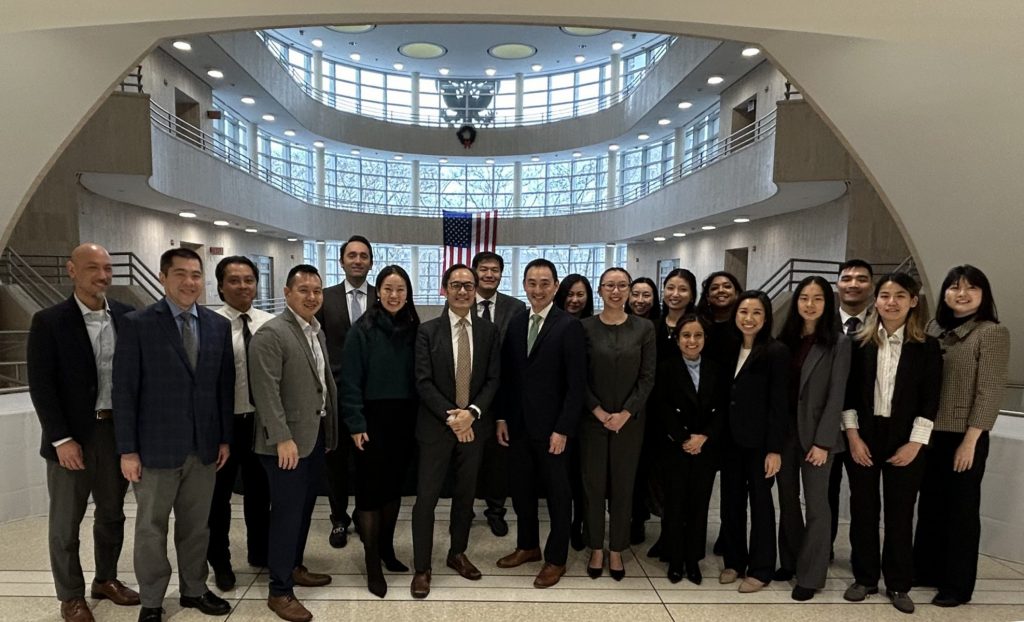
On Friday, December 1, AABANY’s Litigation Committee and Judiciary Committee hosted an exclusive luncheon with EDNY Magistrate Judge James Cho at the EDNY courthouse in Brooklyn. The event was popular with AABANY members – it reached capacity within hours of the registration link being sent out! Eighteen attendees from AABANY’s membership and AABANY Executive Director were presented with an amazing opportunity to socialize with Judge Cho and each other. It was also a unique educational opportunity for the litigators in the group. It included a tour of Judge Cho’s courtroom and an exclusive Q&A with Judge Cho regarding practicing in his court. Thanks to Judge Cho and to all the AABANY members who attended.
To learn more about the Litigation Committee go to this page and the Judiciary Committee go to this page.
AABANY Co-Sponsors Program on Becoming an AUSA
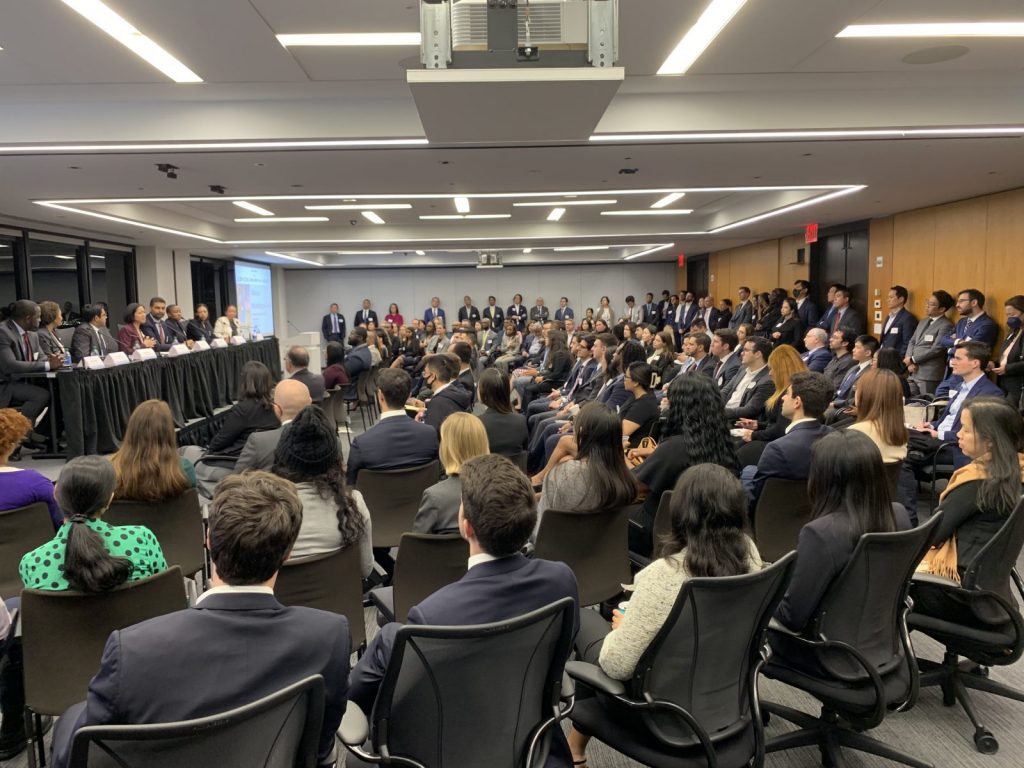
On November 17, AABANY together with several other bar associations co-sponsored a program on “Becoming an AUSA,” hosted by Cleary Gottlieb at their New York office.
Joon Kim, former Acting United States Attorney of the Southern District of New York (SDNY) (and longtime AABANY member) gave opening remarks to welcome the standing room only crowd of more than 100 attendees. He reflected on his years serving with Preet Bharara and then succeeding him after his much-publicized termination during the prior Presidential administration. To this day, Joon remembers the gravity and weight of the words, “My name is Joon Kim, and I represent the United States” whenever he appeared before a judge or jury. The seriousness of representing the United States in numerous cases of public importance has never been lost on Joon. Now a Partner at Cleary, Joon was the first Asian American Acting United States Attorney in the Southern District, following Preet Bharara, who was the first Asian American United States Attorney in the Southern District.
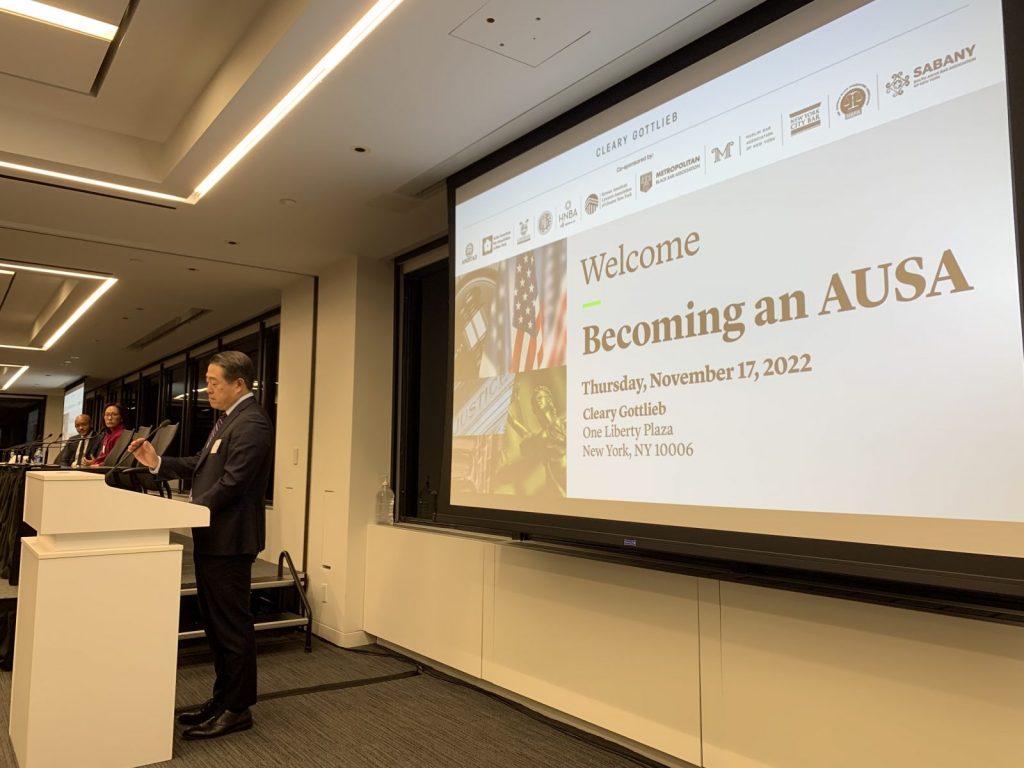
Una Dean, former Assistant US Attorney in the Eastern District of New York (EDNY) and now in-house counsel at IBM, helped organize the program and moderated the opening panel with current United States Attorneys Damian Williams (SDNY) and Breon Peace (EDNY). Una was also a past AABANY Board member.
Both Breon and Damian spoke about their paths to the US Attorney’s office and their desire to work on matters that would have positive community impact. Both expressed the belief that the US Attorney’s office provides a unique opportunity to do just that. Breon talked about criminal investigations and prosecutions his office has been doing, including a case that helped prevent a potential terrorist attack at the US Open. His office prosecuted R. Kelly for human trafficking. They fight hate crimes and also work on affinity fraud cases which target vulnerable members from diverse ethnic and religious communities in New York. In criminal cases, his office actively seeks out alternatives to incarceration and diversion programs as ways to resolve criminal complaints, and also supports programs that facilitate re-entry into society for formerly incarcerated persons. On the civil side, EDNY pursues civil rights cases, fights housing discrimination and brings cases to protect the environment. His civil rights division has also been addressing claims about NYPD’s handling of sexual assault complaints from survivors.
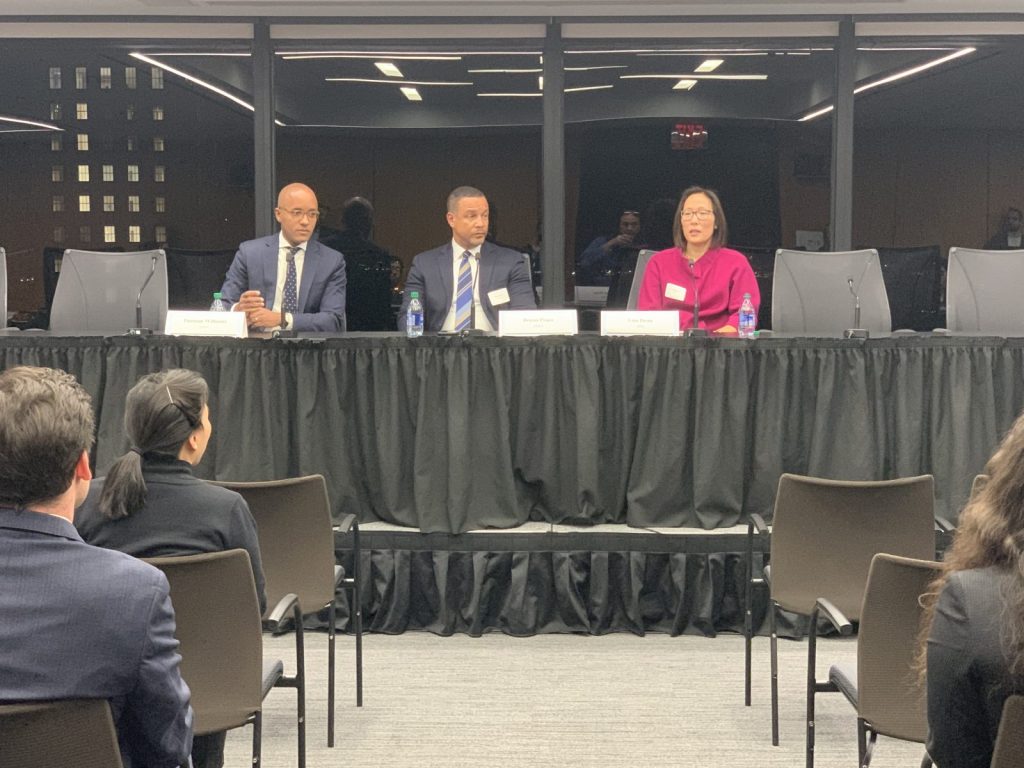
Damian, after being trained at a prominent law firm, believed that, for his further development as a litigator and trial lawyer, the US Attorney’s office was the next logical step. Damian has served in the SDNY for a decade and spoke about his time at the SDNY with great passion and fondness, and his love for the work is palpable. “It is the best job in the world, and the best job I can ever hope to have,” he declared. Assistant US Attorneys fight bullies, he noted, and he relishes working in an environment where everyone is dedicated to doing the right thing, serving the public interest.
Una asked both Damian and Breon what qualities they look for in candidates for their offices. Damian answered that they are looking for good, decent, human beings – “no sharp elbows” – who are team oriented. In other words, they don’t want any jerks. (He used a stronger word, but you know what he means.) Candidates should be good writers who are smart, can think on their feet and exercise good judgment. They must have a strong moral compass, a sense of right and wrong, because so much authority is delegated to junior attorneys at his office, and they must be “doing the right thing, the right way – always.” Candidates need to have a tremendous amount of energy, because they will be working hard. If you are looking for a lifestyle change or money, Damian advised, working at the US Attorney’s Office may not be right for you.
Breon agreed with Damian and added that for him, any candidate that has a win-at-all-costs mentality raises a major red flag. He believes in doing justice, and that means at times, his office may have to decline cases or admit error. A candidate that rushes to judgment would not work out. He also looks for attorneys with the courage to tell investigators or judges that the evidence is not there to bring a case or to prosecute a defendant.
Una then talked about the reason why she put this program together, noting that during her time at EDNY, the composition of the office did not reflect the makeup of the community they served. Breon responded that “it is incredibly important that the [EDNY] is a reflection of the community.” He wants people of diverse backgrounds and experiences in his office to help solve problems, because “diversity is critical to getting the work done.” To promote diversity, EDNY has made changes to make hiring more diverse and inclusive, such as by making the process more transparent, has implemented a mentoring program for all new AUSAs and has sponsored trainings through the Diversity Committee.
Damian pointed out that he is the first African American US Attorney at SDNY and acknowledged that diversity is a challenge that needs to be addressed. He believes that outcomes are better when there are diverse views on the team. He also offered that the jury box will look like New York, so the government table should try to look like New York as well. Damian emphasized that politics has no role to play in the US Attorney’s office, no matter who the sitting President happens to be. He shared that Justice Sotomayor, at the start of her career was an Assistant District Attorney in Manhattan, and in a recent speech, she stated that she became a prosecutor because “it gave her the broadest option to do justice.” Damian agrees with that view.
Breon and Damian both closed by extolling the virtues of public service, particularly at the US Attorney’s office. Damian finds it hard to leave his desk each night because of all the great cases he gets to work on. “When I go home at night,” Breon declared, “I feel like I’ve done something good for the community.”
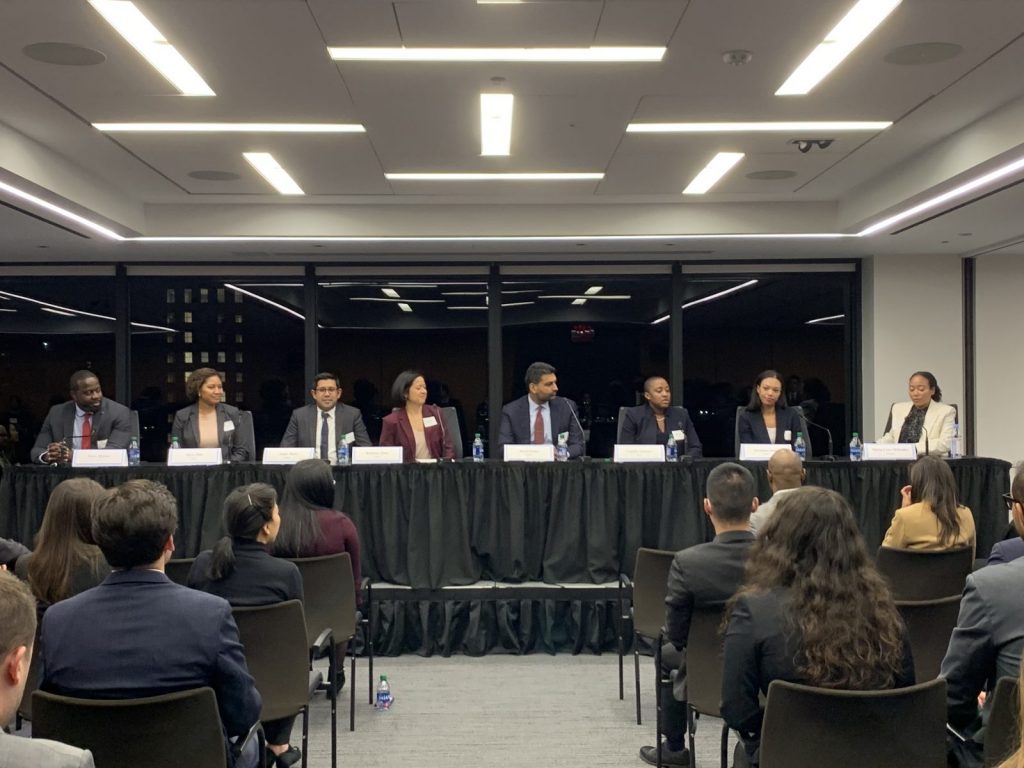
After Damian and Breon spoke, the program shifted to a panel of attorneys of color from both SDNY and EDNY, in both criminal and civil divisions, moderated by former AUSA Maria Cruz Melendez, now a Partner at Skadden. The panel included:
· Sagar Ravi, Assistant U.S. Attorney & Co-Chief, Complex Frauds & Cybercrime Unit, SDNY
· Rebecca Tinio, Assistant U.S. Attorney & Co-Chief, Civil Frauds Unit, SDNY
· Hiral Mehta, Assistant U.S. Attorney & Deputy Chief, Business and Securities Fraud Section, EDNY
· Marietou Diouf, Assistant U.S. Attorney, International Narcotics and Money Laundering Section, EDNY
· Camille Fletcher, Assistant U.S. Attorney, Narcotics Unit, SDNY
· Dara Olds, Assistant U.S. Attorney, Civil Division, EDNY
· Ivory Bishop, Assistant U.S. Attorney, General Crimes, EDNY
All the panelists echoed the passion of Damian and Breon in their love of their work and the weight accorded to representing the United States in court on important cases of great public interest, in both criminal and civil matters.
Hiral Mehta (EDNY) spoke about the proactive nature of the office and the flat structure. There is no hierarchy, and everyone’s input is sought. Ivory Bishop (SDNY) talked about getting to work on all types of cases, from street crimes to public corruption.
Rebecca Tinio (SDNY) mentioned that her cases were great for training, because they go to trial. Her unit works on high stakes cases, such as the tax and bankruptcy case involving Purdue Pharma, the anti-kickback cases involving Novartis, and groundbreaking cases involving the Clean Air Act.
Maria asked the panel what role diversity plays in the cases that the offices see. The panelists gave examples from cases they worked on, in which their own diverse backgrounds and experiences allowed them to connect with and relate to the witnesses in the case, ultimately leading to successful outcomes.
Maria asked the panel to address the hiring process. Dara Olds (EDNY) stated that her office has separate criminal and civil tracks. Rebecca (SDNY) explained that her office has one unified process for all applicants. Both offices have initial interviews, some conducted by those on the panel. Both offices request writing samples, which are reviewed to determine whether a candidate will advance. If the candidate gets through the first round, they are interviewed by more senior AUSAs, including section chiefs. The final round would involve the US Attorney and their executive staff.
Sagar Ravi (SDNY) stated that they are always accepting applications, and Hiral (EDNY) confirmed the same for his office, except during times when a hiring freeze is in place. Currently, there is none so right now “the doors are open.”
What if an applicant thinks that they do not have the right credentials to apply? Dara (EDNY) noted that the US Attorney’s office does not accept applicants straight from law school and encouraged everyone who has obtained several years of experience to apply, regardless of whether they are applying from a large firm or if they had clerked for a judge. Camille Fletcher (SDNY) advised that even if you don’t get called for an interview the first time, you should try again.
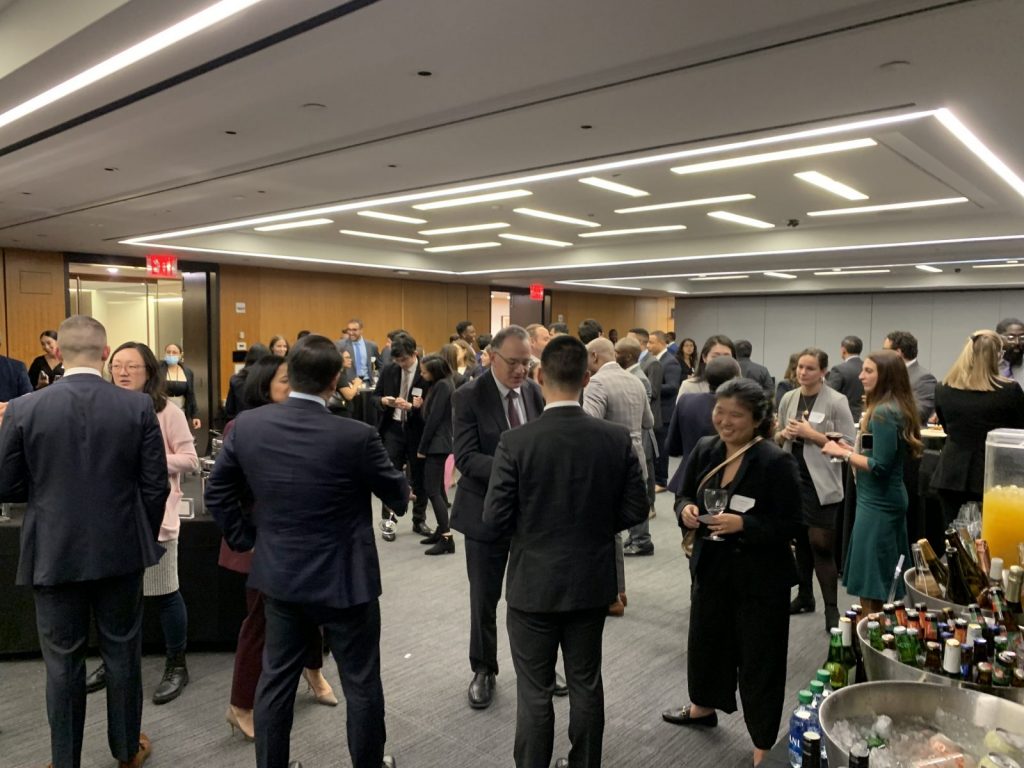
After the panels were done, all the attendees stayed for a reception with food and drinks generously provided by Cleary. Many of the panelists stayed to speak directly with the panelists and ask the questions they were not able to during the main program. The room was buzzing with lively conversations among prosecutors, attorneys, and law students in attendance.
Much thanks and appreciation go to all the speakers and moderators for the evening. Thanks to Una Dean for spearheading the event, to Cleary for being such a gracious host, and to all the co-sponsors:
· Amistad Long Island Black Bar Association
· Caribbean Attorneys Network
· Dominican Bar Association
· Hispanic National Bar Association – Region II
· Korean American Lawyers Association of Greater
New York
· Metropolitan Black Bar Association
· Muslim Bar Association of New York
· New York City Bar Association
· National Black Prosecutors Association
· South Asian Bar Association of New York
AABANY Hosts Private Viewing of “Photographic Justice: A Tribute to Corky Lee”
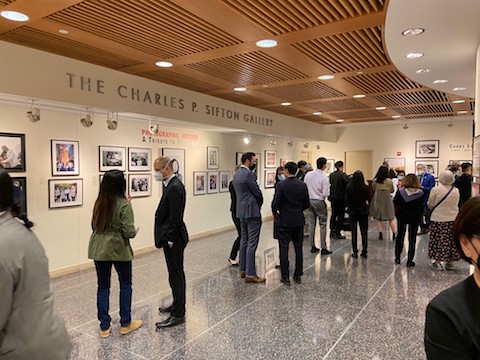
On Thursday, May 19, 2022, AABANY board members, committee chairs and invitees attended a private viewing of “Photographic Justice: A Tribute to Corky Lee.” The event was well-attended by numerous EDNY judges, community members and elected officials.
“Photographic Justice” pays homage to the life and work of renowned New York City-based photographer Corky Lee, who documented the Asian American movement through the last five decades. The group photography exhibit features a selection of Lee’s works along with that of other Asian American photographers. The term “photographic justice” has been used by Lee to describe his mission to rectify the exclusion of Asian Americans in America’s visual history.
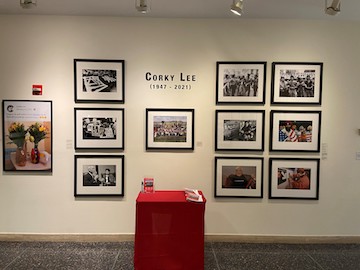
Lee’s last project was to chronicle the effort to combat anti-Asian violence before his passing from COVID-19 in 2021.
A long-time friend of AABANY, Lee was the photographer for AABANY’s Annual Dinner for many years. In 2017, AABANY co-sponsored a photo exhibit by Corky Lee in celebration of Asian Pacific American Heritage Month. At the event, Lee discussed his experiences as a photojournalist over the years as and his role as the self-proclaimed “Undisputed Unofficial Asian American Photographer Laureate.”
AABANY President William Ng, in his remarks during the reception, read the dedication to Corky from AABANY’s Anti-Asian Hate and Violence Report: “Corky Lee personified the Asian-American movement, and AABANY honors his memory by carrying on his work to combat indifference, injustice and discrimination against Asian Americans.”
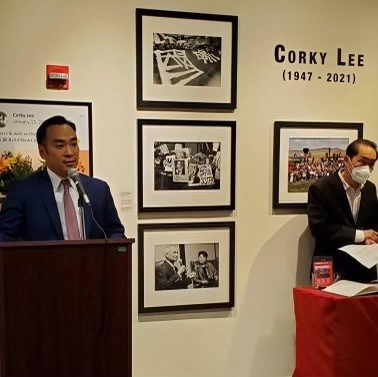
This exhibit is open to the public Monday through Friday from 8:30 AM to 5:00 PM through November 20, at Hon. Charles P. Sifton Gallery of the United States Courthouse for the Eastern District of New York (225 Cadman Plaza East).
Thanks to AABANY board member Chris Kwok for his instrumental role in organizing and making this VIP reception possible.
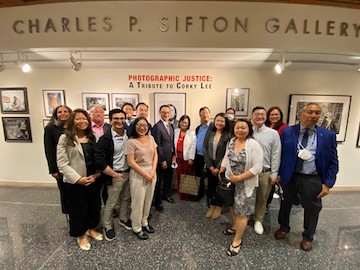
Fall 2022 Federal Judicial Internship Opportunity with Hon. Dora L. Irizarry, E.D.N.Y.
Federal Judicial Internships Available
The Honorable Dora L. Irizarry, U.S. District Judge for the Eastern District of New York, currently is accepting applications for Fall 2022 Internships.
Qualifications:
- Must be a rising second or third year law student.
- Must have good grades.
- Must have good research, writing, and analytical skills, although participation in Law Review or a Journal is not a prerequisite.
- Military and/or other life/career experience is a plus.
- Must be vaccinated fully against COVID-19 (including a booster shot).
In light of the COVID-19 pandemic, interested law students should forward their application package in PDF format via email to irizarry_chambers@nyed.uscourts.gov.
- One-page cover letter briefly describing your background, why you are interested in a legal career and setting forth why you are interested in interning for Judge Irizarry specifically.
- Resume.
- Law school transcript. Self-prepared transcripts will not be accepted.
- One recent writing sample no longer than 10 pages. Journal or research articles will not be accepted.
- Two to three reference letters.
The deadline for receipt of materials is May 13, 2022.
Please note that, while these are not paid internships, the Judge will participate in any appropriate sponsored program that provides academic credit or stipends for interns.
If you have further questions, please contact chambers at: 718-613-2150.
Apply for EDNY Federal Judicial Internship with Hon. Dora L. Irizarry
The Honorable Dora L. Irizarry, U.S. District Judge for the Eastern District of New York, currently is accepting applications for Spring 2022 Internships.
Qualifications
- Must be a second or third year law student.
- Must have good grades.
- Must have good research, writing, and analytical skills, although participation in Law Review or a Journal is not a prerequisite.
- Military and/or other life/career experience is a plus.
In light of the COVID-19 pandemic, interested law students should forward their application package in PDF format via email to irizarry_chambers@nyed.uscourts.gov.
- One-page cover letter briefly describing your background, why you are interested in a legal career and setting forth why you are interested in interning for Judge Irizarry specifically.
- Resume
- Law school transcript. Self-prepared transcripts will not be accepted.
- One recent writing sample no longer than 10 pages. Journal or research articles will not be accepted.
- A list of 2-3 references with their contact information. Reference letters preferably should be included with the submitted package, but also may be sent to chambers at the chambers email address above and not directly to the Judge.
The deadline for receipt of materials is November 1, 2021.
Please note that, while these are not paid internships, the Judge will participate in any appropriate sponsored program that provides academic credit or stipends for interns.
If you have further questions, please contact chambers at: 718-613-2150.
The EDNY ADR Department Develops the Pilot EDNY Mediator Incubator, a Mediation Mentorship Program
The EDNY ADR Department has developed the Pilot EDNY Mediator Incubator, a mediation mentorship program designed to offer practical experience to junior attorneys (less than 15 years of experience) with a substantiated interest in mediating federal cases, but who have little experience as a mediator. To be eligible to apply, applicants must be admitted to practice in the Eastern District of New York. Applicants are also required to be admitted to the Bar of the State of New York for at least five (5) years and must have completed a total of twenty-four (24) hours of mediation training. The required twenty-four (24) hours of mediation training may be the result of attendance at several distinct programs, or at one twenty-four (24) hour training.
After admission to the program, incubator candidates will be required to attend an initial training and orientation session, observe a minimum of three (3) EDNY mediations, and co-mediate at least three (3) EDNY mediations with an experienced EDNY Mediation Panelist. Any observations or co-mediations done through the EDNY Mediator Incubator will be done on a pro bono basis. Each incubator candidate will be matched with an experienced mentor. After successful completion of the EDNY Mediator Incubator, candidates will be eligible for, but not guaranteed, admission to the EDNY Mediation Panel. Applicants must complete the enclosed application and submit one letter of reference from a person who has direct knowledge of the applicant’s interest in and experience with mediation, and one letter of reference from a person who has direct knowledge of the applicant’s legal knowledge and areas of expertise. Applicants will be assessed based on their experience with mediation, including mediation advocacy and active participation in mediation and dispute resolution organizations and associations. Availability and commitment to the program will also be taken into consideration.
Here is a link to the application: img.nyed.uscourts.gov/files/forms/Mediator Incubator Application and Instructions.pdf
AABANY Co-Hosts Webinar on Becoming a Magistrate Judge
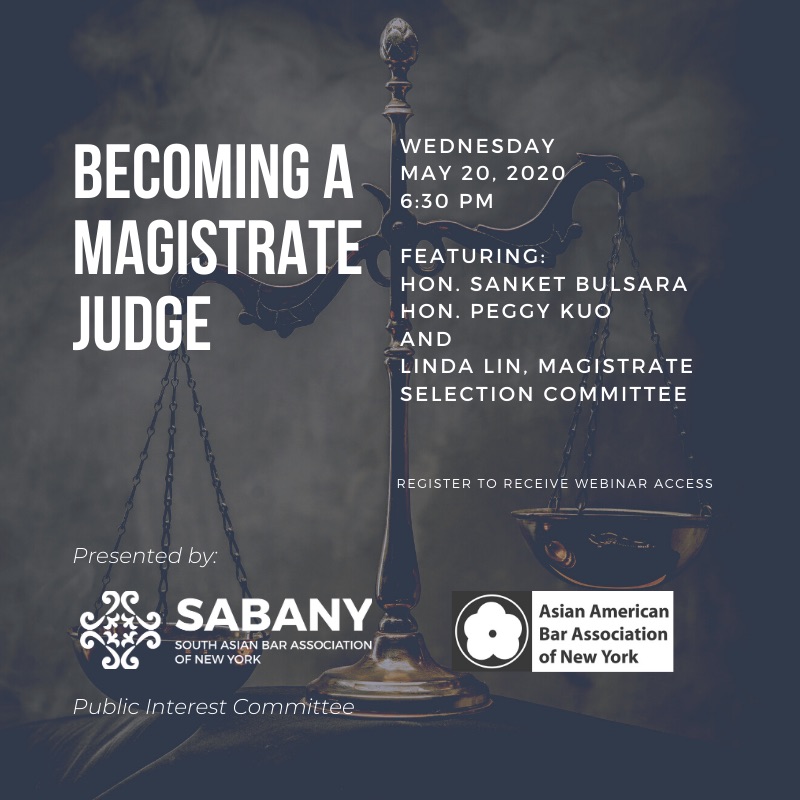
On May 20, 2020, the Judiciary Committee of the Asian American Bar Association of New York (AABANY) and the Public Interest Committee of the South Asian Bar Association of New York (SABANY) co-hosted a panel on how to become a Magistrate Judge. Recently, the Eastern District of New York announced vacancies for four US Magistrate Judge positions, the first time so many opportunities have been simultaneously available since the positions were created. The webinar provided important information and advice for individuals who might be considering a career as a Magistrate Judge.
The event featured panelists Hon. Sanket Bulsara, Hon. Peggy Kuo, and Linda Lin. Judge Bulsara was appointed as a Magistrate Judge of EDNY on August 28, 2017, and previously served as Acting General Counsel of the Securities and Exchange Commission. Judge Kuo was appointed on October 9, 2015, and prior to her appointment, she served as the Acting Deputy Chief of the Civil Rights Division Criminal Section at the U.S. Department of Justice; litigation counsel at Wilmer Hale, LLP; Chief Hearing Officer at the New York Stock Exchange; and Deputy Commissioner and General Counsel of the New York City Office of Administrative Trials and Hearings. Linda Lin is the General Counsel of Business Unit Support at QBE North America and a member of the EDNY Magistrate Judge Merit Selection Panel. Austin D’Souza, Principal Law Clerk to Hon. Faviola A. Soto at the New York Court of Claims and Vice President of Public Relations at SABANY, served as the moderator.
Judge Bulsara and Judge Kuo discussed their responsibilities as Magistrate Judges. They emphasized that though their docket is heavily civil, varying between 400-500 cases per judge, they also play an important role on the criminal side. Magistrate Judges are on criminal duty approximately once every ten weeks, during which they preside over arraignments, initial appearances, and bail hearings. They also conduct jury selection in felony cases. Judge Bulsara noted that his favorite part of being a Magistrate Judge is presiding over naturalization ceremonies and interacting with wonderful colleagues.
Linda Lin described the application process and how potential candidates are evaluated. Members of the Selection Panel independently review the applications and decide on which candidates to interview. Prior to the interview, the panel conducts due diligence and may reach out to references beyond those mentioned in the candidate’s application. The Selection Panel also requests writing samples, preferably those that demonstrate analysis and are centered around advocacy and litigation. Finally, five names are presented to the Board of Judges, who decide whom to appoint as a Magistrate Judge. While reviewing applications, members of the Selection Panel look for the following qualities: scholarship, from academic records to achievements; active practice of the law, including breadth and depth of experience, professional competence, and pro bono and public service activities; knowledge of the court system and recent experience in front of the federal bench; and personal attributes, or judicial temperament.
Judge Kuo advised individuals applying to become a Magistrate Judge to prepare for their interviews by going back and reading their application and writing samples, looking up the biographies of members of the Selection Panel, and reviewing the Rules of Civil Procedure. Judge Bulsara urged candidates to take advantage of the mock interviews offered by AABANY and sit in on proceedings in court.
We thank our panelists for speaking on the program and sharing insightful advice about the process of becoming a United States Magistrate Judge. Thanks also to Austin D’Souza for serving as an excellent moderator. For more information on AABANY’s Judiciary Committee, please see https://www.aabany.org/page/115.
AABANY Co-Sponsors: A Reenactment of Ozawa & Thind
On Thursday, May 23, 2019, AABANY and SABANY co-sponsored a trial reenactment of two Supreme Court cases, Takao Ozawa v.
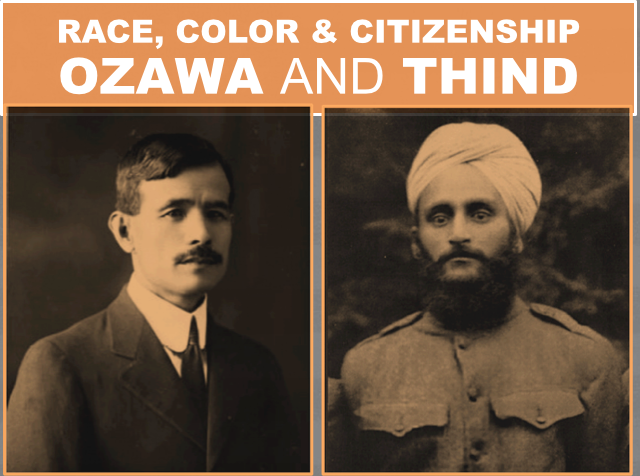
Takao
Bhagat Singh was born in India and received his bachelor’s degree there before moving to the United States, seeking higher education in 1913. He completed his Ph.D. at the University of California and went on to give lectures in metaphysics. He also joined the U.S. Army during World War I and became the first turbaned Sikh man to serve alongside American soldiers. After the war ended, he was honorably discharged and applied for citizenship. His petition for citizenship was granted initially in Oregon, but government attorneys initiated proceedings to have it canceled on the grounds that he was not “white.” His case went to the Supreme Court, where he presented scientific evidence asserting that South Asians, such as himself, were actually of Aryan descent and therefore of the Caucasian race and thus he should be granted citizenship.
However, the Supreme Court held that even though it “may be true that the blond Scandinavian and the brown Hindu have a common ancestor in the dim reaches of antiquity … the average man knows perfectly well that there are unmistakable and profound differences between them today.” The court backtracked on the rationale it used in Ozawa, where it relied on scientific evidence to find that Takao Ozawa could not be classified as Caucasian, and therefore was ineligible for citizenship.
As a result of the Supreme Court’s rulings in Ozawa and Thind, many Asians were stripped of their citizenship retroactively, leading a man named Vaishno Das Bagai to take his own life. He left a note that read: “But now they come and say to me I am no longer an American citizen. What have I made of myself and my children? We cannot exercise our rights, we cannot leave this country. Humility and insults… blockades this way, and bridges burned behind.”
These two Supreme Court decisions are a stain on our great nation’s history. They set the precedent that being an American was not enough, that to be a real American you had to be “white” based on society’s perception of what qualifies as “white” during a given period of time in history.
The reenactment serves as a reminder of the struggles that Asian Americans had to endure in the past, and it highlights why we must continue to strive to create change for the future generations of Asian Americans.
We thank Judge Denny Chin and Kathy Hirata Chin for leading the reenactment program and thank our judicial all-star cast which included: EDNY Chief Judge Hon. Dora Irizarry, Hon. Kiyo Matsumoto, Hon. Pamela Chen, Hon. Peggy Kuo, Hon. Sanket Bulsara, and Hon. Faviola Soto.
Thanks to SABANY for performing this re-enactment. AABANY was proud to be a co-sponsor, presenting 1.5 CLE credits in the Diversity & Inclusion category.
